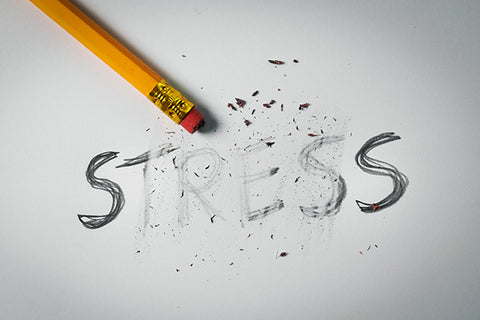Have you ever had that feeling of being overwhelmed? A simple task such as having a conversation suddenly becoming too much for you?
The chances are you are suffering from stress. This is a psychological and physical reaction to the demands of everyday life, and it is extremely important to be aware when it is happening.

What is stress?
Stress is generally described as the body’s response to pressure. It is the feeling of emotional, mental or physical tension, and can come about from any physical event or thought.
Our body produces hormones as a response designed to tackle this tension. In some instances, stress can be a positive, but too much stress can have endless negative effects. Mental symptoms can include anxiety and depression, or being agitated and struggling to relax. Physically, it can cause a problem with everything - digestion, blood pressure, muscle tension or even chest pains.
Stress can become chronic, leaving the sufferer in what is known as a permanent state of physiological arousal. This is when the body suffers from stress so frequently the nervous system is unable to respond.
According to an online poll by YouGov in 2018, 74% of people felt so stressed that they were unable to cope. This shows how common stress can be in modern life, and collective awareness has never been so critical.
One important factor in dealing with stress is community. Communal support is such a vital, primitive component and when this is lacking, a person can suffer from social isolation. Feeling lonely has a negative impact on mental health, and research suggests it puts the individual at increased risk of depression, anxiety, low self-esteem, sleep problems and increased stress.

The stress awareness movement is striving to raise the subject of the dangers of isolation, and what can be done to combat it. With this in mind, here are some pointers for dealing with personal stress, should it arise:

Tip 1: Socialising
This may appear a simple one, but embracing community and socialising with others has such underrated benefits for our mental health. Social situations such as sport or a hobby class are great to help create a focus and purpose. Even meeting up with friends gives us the opportunity to talk to somebody, express ourselves or discuss our problems. Talking over your worries with somebody is an excellent way to decrease stress levels.
Tip 2: Get moving
Almost any form of exercise can decrease stress. It works by reducing the levels of stress hormones produced in the body, whilst keeping you fit at the same time. Walking, jogging and hill-climbing are great basic forms of movement, with yoga, cycling and swimming other options. You can even take up dance or a sport - the most important thing is to choose something you enjoy.
Tip 3: A good night sleep
Sleep is an ironic factor in that a bad night's sleep can create the environment for you to become stressed, and being stressed can lead to sleep problems. When you’re tired, you are likely to become more agitated, which can increase stress levels. Implementing a good routine before bed is the first step in tackling any sleep issues you may have, and can include:- Deep breathing and/or stretching
- Avoiding technology or blue light a few hours before
- A warm bath
- Only eat a light snack before bed
- Listen to music

Tip 4: Meditation
There aren’t many practices better for your mental state than meditation. The process involves focusing your mind and attention to moderate your thoughts and feelings, resulting in the person feeling more relaxed, tranquil and able to concentrate better. Popular types of meditation include concentration meditation and transcendental meditation, and again, it is important you choose the one most suitable to you.
Tip 5: A better diet
Bad eating habits can be a major contributor to stress levels. Furthermore, you will tend to crave foods that are high in fat and sugar when you are in a state of stress. Although nutrition can be a bit of a minefield, it is recommended to follow these tips:- Eat a balanced diet
- Choose whole, natural foods
- 5 portions of fruit and vegetables per day
- Get an adequate amount of protein (0.7-1.8g per kg body weight daily)
- Avoid highly processed foods
- Monitor caffeine intake

Tip 6: Cold water therapy
Cold water exposure is the buzz trend at the moment, and that’s entirely based on the range of benefits it offers. Anxiety often comes with an increased heart rate, so getting yourself in a cold/ice bath, having a cold shower or getting in the river will lower the heart rate and remove the breeding ground of stress that is an anxious state. Bear in mind this will require gradual training, so start off with a hot and cold shower before you go jumping in the ice baths!
How can NuroKor help with stress?
If your stress has translated into physical muscle tension, bioelectrical therapy can be helpful to manage it.
Alleviating physical muscle tension is a great way to relax your body and remove stress and anxiety. Muscle tension itself is the body's response to stress, and it can become a dangerous cycle that severely impacts your mental health.
Specifically using the Neuromuscular (NMS) programme will help relax the muscles and can reduce these feelings. NMS works by stimulating the muscles to produce the peptides and proteins needed for healthy body function, and may also help improve circulation and mobility.
For more information on the benefits of our NuroKor technology, please visit our product pages here.



